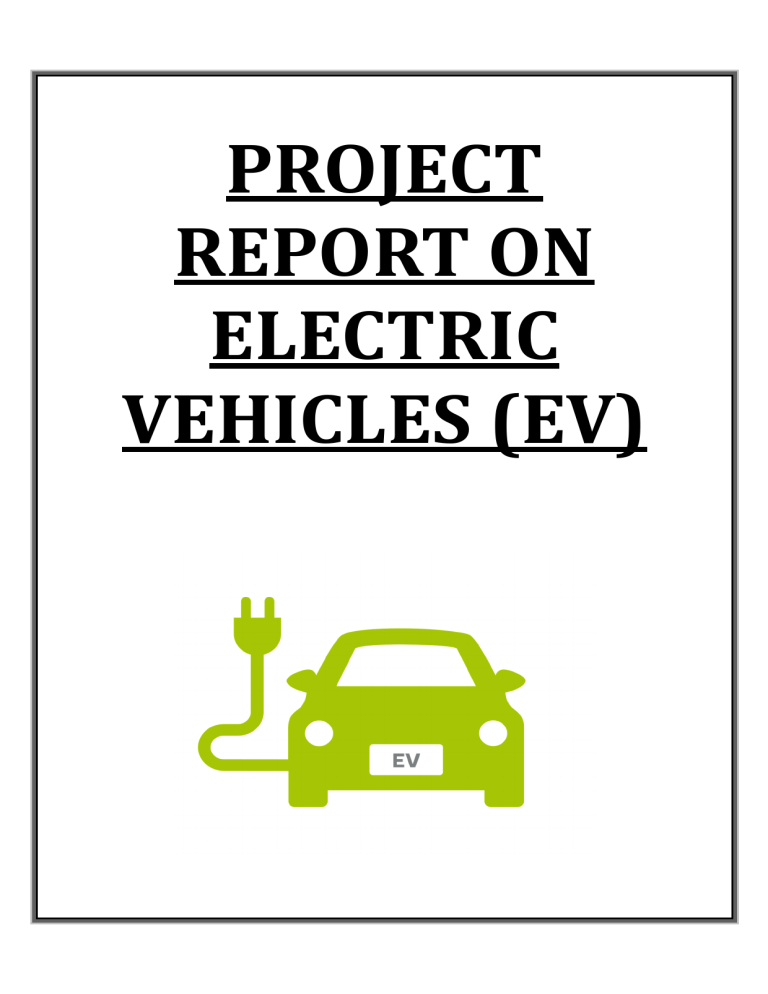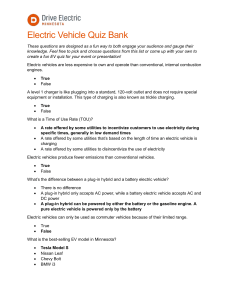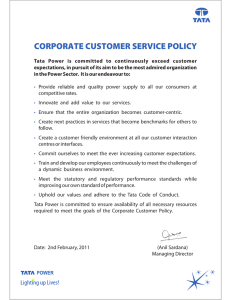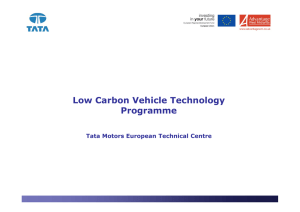
PROJECT REPORT ON ELECTRIC VEHICLES (EV) Electric Vehicle (EV) Sector Segmentation When we talk about the electric vehicle sector, most of us think about some major automobile makers like Tata Motors or Mahindra Auto but this sector is not just limited to the manufacturers. Based on various parts, segments, and infrastructure used, we can classify the electric vehicles (EV) sectors into four major parts: 1. Auto Manufacturers: This classification includes those companies that compile all the spare parts and technology to form a vehicle out of them. 2. Auto Parts and EV Software: These include companies that manufacture spare parts and other technological software that make EVs smart and technologically advanced. 3. Battery Manufacturing: The heart of every EV is the battery that powers it. A battery is the prime source of energy for an electric vehicle. 4. EV Charging Stations: The battery that powers an EV needs to be charged regularly to run the vehicle and therefore this classification includes the companies that build the infrastructure required to set up charging stations at various public places and the residence of the customer as well. Based on this segmentation in mind, we have brought a complete portfolio of Indian electric vehicles (EV) stocks to look forward to in the future. The list includes both, the already listed companies and also the newcomers to the market that may turn out to be a good choice to invest in. Auto Manufacturers (EV) Electric Vehicle Stocks in India Here is the list of Electric Vehicle Stocks in the Auto manufacturer sector. We have divided the stocks into 2 classificationsProven/established players and Unproven/new players. Proven/Established Players • Companies having experience in the automobile industry. 1. TATA Motors One of the oldest players in the market, TATA Motors is the most diversified company in the segment. From fourwheeler passenger cars to heavy commercial vehicles like buses, trucks, and trailers, the company has a good presence in every segment. This is one of the best electric vehicle stocks in India, with the support of its allies like TATA Chemicals for batteries, TATA ELXSI for software, and TATA steel for body structure, TATA Motors has a great scope of expansion in the future and it has started showing the traits of this growth. 2. Mahindra & Mahindra Similar to the portfolio of TATA Motors, Mahindra & Mahindra also shares a good space in a diverse class of vehicles like passenger cars, trucks, and other commercial vehicles. Mahindra has had a legacy in the agriculture transport industry with a lineup of various tractors. 3. Maruti Suzuki India Ltd Maruti Suzuki India is the leading brand when it comes to the market of entry-level cars that are budget-friendly. Being the first in this segment, the company enjoys the majority of the market share. The only difference here is that the above-stated companies have already taken a step ahead in the EVs market with the vehicles whereas Maruti Suzuki is yet to enter the market. The company is rumored to launch its most selling car, WagonR, in an electric variant as its maiden car in the market. 4. Hero MotoCorp Limited With a major segment of EVs dominated by four-wheelers, there is hardly anyone talking about electric two-wheelers. Hero MotoCorp has taken the initiative to expand this minor segment of electric two-wheelers. In the Indian market, where two-wheelers are the most affordable option of private transport for anyone, a good lineup of already established players like Splendor, Passion Pro and Hero Pleasure can turn out to be a good move thereby giving the first-mover advantage to the two-wheeler giant leaving behind its competitors like Bajaj, TVS and the newbie Ola Electric. Unproven/New Players • Consists of the newcomers or companies with an uncertainty of presence in the segment. 1. Himadari Specialty Chemical Limited The company is a significant presence in the chemical industry but it has now announced to step into the EV segment by making electric bicycles. 2. Greaves Cotton Having a diversified class of business, Greaves Cotton has recently acquired a two-wheeler electric company named Ampere Vehicles with a target of entering the two-wheeler EV manufacturing market as the segment has a strong potential to prosper in the coming future. Auto Parts and EV Software Stocks in India Here is the list of Electric Vehicle Stocks in the Auto Parts sector. 1. Motherson Sumi Systems Limited Motherson Sumi is one of the largest manufacturers of automobile parts in India. Having a humongous scale of production, the company has acquired various small-scale auto parts manufacturers in the past and has started to manufacture EV-specific parts. As an EV requires more components than a conventional vehicle, the business undertaken by Motherson Sumi is expected to expand in the coming years making it fruitful for the company. The company is also in the talks to supply EV-specific parts to its various buyers in the future. 2. TATA ELXSI Limited TATA ELXSI is an IT-based software development company that is primarily indulged in the development of software that is used by EVs made by TATA Motors. Apart from this, the company has also developed stock software that can be used by any electric vehicle. ELXSI is also expected to sell this specifically designed software in the form of licensing to other auto manufacturers in the future. Battery Manufacturing for Electric Vehicle Stocks in India Here is the list of Electric Vehicle Stocks in the Battery Manufacturing sector. 1. Exide Industries Limited & Amara Raja Batteries Limited Both of these companies are major players in the battery industry. Till now, they have been manufacturing lead-based batteries that are used in traditional vehicles. But now they are on the path of manufacturing lithium-ion-based batteries that form an essential component of an electric vehicle. 2. TATA Chemicals Limited The vision of Tata Chemicals is different from its peers. The company aims to develop an ecosystem of battery generation. They aim to gather the raw materials for battery production, manufacture the batteries at their production facilities, and also have the provision of recycling the worn-out batteries in the future. The ally with its family company TATA Motors would act as a validation and lead to great exposure of the batteries manufactured by TATA Chemicals in the domestic Indian market and the international market as well under the name of its subsidiaries Land Rover and Jaguar. EV Charging Stations Electric Vehicle Stocks in India Below is the list of EV charging station stocks, electric vehicle charging station stocks also will perform better, since its a part of the EV ecosystem. 1. TATA Power Company Limited TATA Power has an already established business as a consumer electricity-providing company. With an increasing consumer base of EVs in India, TATA Power, in alliance with TATA Motors, has also participated in the race of setting up EV battery charging and swapping stations all over the country. The company has been setting up public charging stations at various parking lots and malls and private charging stations at customer residences and authorized automobile service centers. 2. Power Grid Corporation of India Limited A state-owned company that mainly caters to high-voltage transmission and grid management and provides high-power electricity to industries like telecom. The company is in the run to set up charging stations all over India. Having a state ownership label, the company can be expected to enjoy government contracts and deals in setting up charging stations in the future. 3. National Thermal Power Corporation Limited (NTPC) One of the largest thermal power generation companies in India, NTPC had recently started its transition towards solar power generation. The company was largely involved in the production and installment of solar panels and other solar-powered machines. Following great success in the solar power domain, the state-owned power company is now heading towards EV power generation by the way of setting up charging stations. Reports also claim that we might see solar-powered EV charging stations in the future under the name of NTPC. 4. Indian Oil Corporation Limited (IOCL) A major player in the petrol and diesel industry, IOCL is India’s largest state-owned petrochemicals company that has the largest market share in the current petroleum industry. Although the EV industry is a giant competition to IOCL and its business, still it has taken a step toward the EV sector by setting up charging stations at its petrol pumps all over India. The company has also proposed to increase the charging stations on the petrol pumps with the increase in the demand for them. Why Electric Vehicles are the future of driving in 2022? The global market for electric vehicles (EVs) is growing continuously at a compounded annualized growth rate (CAGR) of 21.7 per cent. It is expected to grow from 8.1 million units to 39.21 million units by 2030. This exponential growth is being driven by various factors, including concerns for pollution. Governments all over the world are encouraging the EV industry through subsidies and regulations, and the consumers are demanding low-emission commuting instead of the fossil fueldriven vehicles, which are endangering our planet. When the first EVs were manufactured/introduced, very high initial cost, low battery range, low speed, and much lower environmental concerns resulted in the industry not taking off. The last 10 years though have seen universal interest among original equipment manufacturers (OEMs), customers, and governments, resulting in huge investments being made in EV manufacturing and battery technology, resulting in millions of vehicles getting sold in various countries. All the major global and Indian OEMs have invested in and launched EVs, and a large number of new OEMs have attracted huge investments and launched very successful models, building the demand for EVs, and thus creating unicorns, too. Tesla has been one of the most successful EV company/brand in the world, but others, including Mercedes Benz, Tata, MG, GM, Audi, Hyundai, Nissan, BMW, and Renault have also launched EVs, which are receiving customer demand in different markets. There is no doubt that EVs are the future of driving and mobility, and while newer materials may be used in the battery chemistry, and innovations will keep taking place, the trend is irreversible because of the following reasons: Significant cost savings on running and maintenance: Running and maintenance costs are a major part of the ownership cost of any vehicle, and it is now well established that EV buyers spend much less on fuel/energy and maintenance, as EVs have fewer moving parts than a gasoline engine, which makes it easier to maintain. EVs have very few parts that may break or need any repair or replacement. So, there is no need to worry about changing the engine oil, thus making it easier to maintain electric cars at a lower cost. Oil, being a dominant energy source, causes a wide range of problems, as transportation remains dependent on oil. But an electric vehicle offers a clean and better way of transportation for everyone. The increase in the number of electric vehicles on the road will reduce the demand for millions of barrels of oil in the future. Eco-friendly savings on CO2 emissions: Shifting to electric mobility will help India save nearly one giga tonne of carbon dioxide emissions by 2030. Each electric car on the road helps in reducing the harmful air pollution for the younger generations to come. The whole world is fighting global warming and drastic climate change, which is increasing conflicts and political tensions between nations. Car buyers are ready to do their bit for the environment by shifting to EVs, which have zero tailpipe emissions, and which will ultimately help save our environment from smog and climate change. This is a great initiative toward reducing the ecological damage and boosting public health. The lesser exhaustion of harmful emissions will lead to better air quality, which means fewer health problems. Incredible driving experience by reducing driving fatigue/stress: Electric vehicles don’t have gears, which ensures an excellent driving experience with no complicated controls. Just accelerate, brake, and steer to manage and enjoy a calm, convenient, safe, and noise-free ride. Lesser noise is another added benefit of using an electric car. The electric motors are very quiet compared to internal combustion engines and their exhaust systems. Several studies show that vehicle noise can have many negative impacts, such as increased anxiety, depression, high blood pressure, heart diseases, stroke, and so on. The noise pollution may also increase the risk of severe depressive symptoms in humans. Convenient charging: Electric vehicles rely on electricity to charge their batteries instead of using fossil fuels like petrol or diesel. With more EV battery charging stations popping up now, it will be easier for the users to charge the batteries at a nearby station rather than wait in a long queue at the CNG stations or petrol pumps. The EV owners can also choose to charge the batteries with charging equipment from the comfort of their homes. Tax benefits: Buying or leasing an EV can give you an advantage in tax savings. If you have an electric vehicle registered in your company’s name, then you can avail yourself of the 40 per cent depreciation in the first year to save on income tax. The government is also supporting your idea of buying an electric car, and has already introduced an EV policy under which you can avail yourself of additional benefits of up to Rs 1.5 lakh. Conclusion With this, we come to the end of our list of best electric vehicle stocks in India. The main thing to notice here is that one can find a TATA company in every segment of the EV sector and this is the ecosystem that the TATA Group of Companies is aiming at. A full cycle of production includes the manufacturing of spare parts and batteries, development of software, assembling of these parts to form an electric vehicle, and ultimately setting up charging stations for EVs at varied locations all over the country. Apart from this, companies like Hero MotoCorp and Maruti Suzuki are the prospective players that are in the queue of launching their EVs soon in the market. From a bird’s eye view, the companies mentioned above could be a great bet to put upon as the EV segment is yet to achieve its full potential in India.







